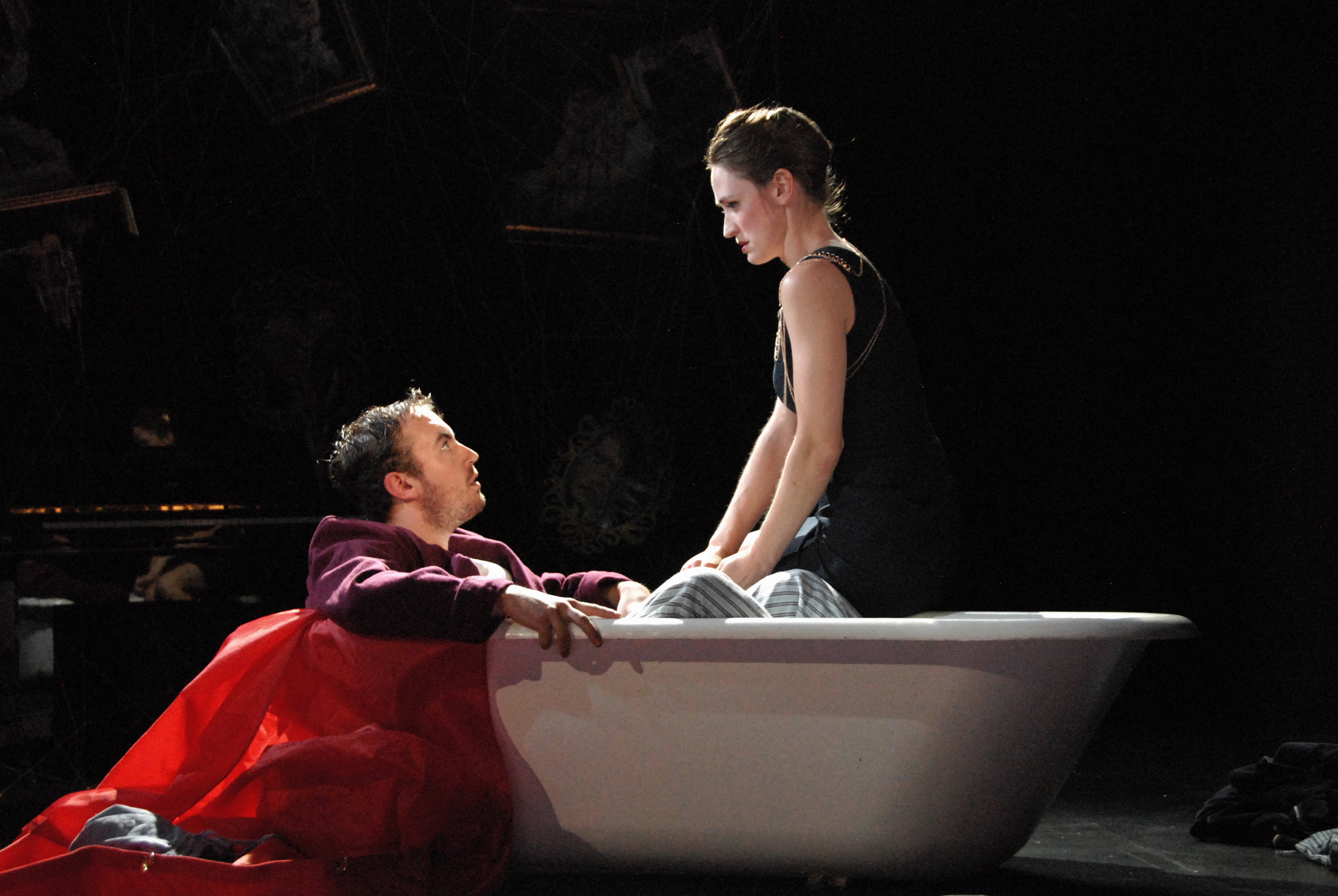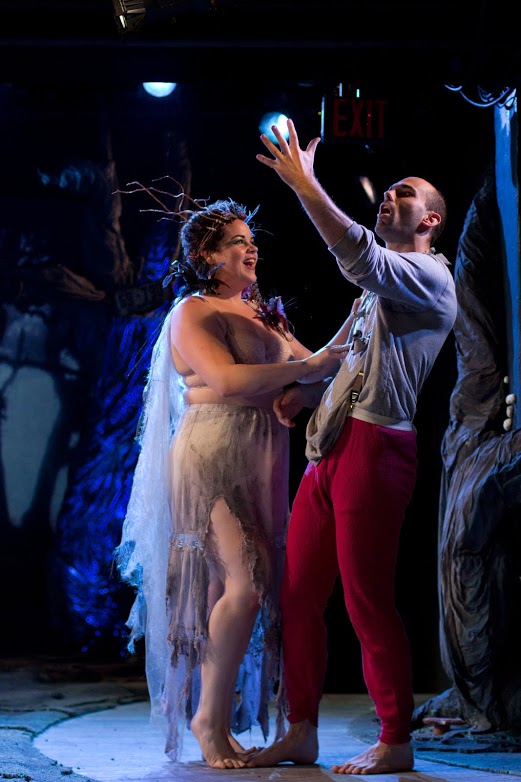Review of Grounded, Westport Country Playhouse
Technology determines the quality of our lives. That truism may seem rather obvious, but the question is: what are its implications? We may not want to imagine, or remember, a life before cellphones, or before television, or before telephones, or cars, or refrigeration. We may believe the world is better with those things in it. How about drones?
Grounded, by George Brant, directed as a slow-burn tour de force by Liz Diamond at Westport Country Playhouse, makes us not only imagine, but also confront, the increasing prevalence in our world of drones—or unmanned, remote-controlled aircraft—and what their presence entails. In sum: we’re all sitting ducks.
The pilot (Elizabeth Stahlmann) (photo: Carol Rosegg)
The pilot (Elizabeth Stahlmann, in a smashing Connecticut debut as a professional after a fine run as a student actor at the Yale School of Drama) is our confidante. She tells us intimate details about her life, her loves, her hopes. She makes us exult with her as she professes her undying love of “the blue”—the endless stretches of sky she regards as her natural habitat when seated at the commands of her “Tiger,” or beloved fighter-plane. She has run missions in combat, gleefully bombing those minarets sticking up from the sand back into sand.
She also makes us feel how a smug “lone wolf” sensibility can be cracked by the right guy. A guy turned on by her manliness, and by the flight suit she wears as a badge of honor and which becomes at times a rhetorical device and an aphrodisiac. The guy seems to weep often, but that might just be how it seems to her (or it’s Brant’s way of making sure we don’t miss his efforts to circumvent gender “norms”).
Grounded is told entirely from the pilot’s point of view. We neither see nor hear any other characters, and, unlike some one-person narrative shows, the pilot doesn’t try to imitate or take on the manner of others. It’s the kind of one-sided world that one might conjure in a confession. Others are always somehow external to the speaker’s plight.
Not that the couple, soon joined by a baby girl called Sam, don’t have a real shared affection. But when, after giving birth, the pilot tries to resume her former chariot in the blue, she finds that, in the interim, technology has intervened. Manned flights to destroy what she likes to call “the guilty” (as opposed to “the enemy”) are passé. Warfare is now safer for our side and more lethal for the other side. The drones only risk their $11 million price-tag, not U.S. casualties.
The pilot wonders, rightfully, if assignment to the “chair-force” is her punishment for being so unmanly as to give birth to a child. Not so, she’s assured. This is the assignment that will show her to be upper echelon. And she tries to take it in that spirit, though not for a moment believing it to be true.
The vicissitudes of her, at first, useful acclimation to the reality of conducting armed combat in a safe trailer a short drive from her home, near Las Vegas, and then the alarming disconnect between those two spheres of her life, is the drama of the story. A drama that the pilot lives for us in a forthright, can-do, oh my god not this, manner.
The pilot (Elizabeth Stahlmann) (photo: Carol Rosegg)
To work, the play needs a sympathetic and earnest teller for the tale. Director Liz Diamond is working with a godsend. Elizabeth Stahlmann, trim, angular, pretty but also what used to be called “boyish,” is the perfect type for the role. And her command of Brant’s language is mostly flawless. What’s more, she’s able to communicate with great presence the non-verbal “ah ha” moments, those moments when—whether posing for a photo with pregnant belly in an open flightsuit, or reacting to something she can see but we can’t, or turning on a dime from mom-face to air force major-face—the pilot becomes personality, not simply function.
And her performance makes manifest the real drama here: The human cost of our technological advances. Brant wants us to consider how the drone technology of surveillance impacts our collective lives (can anyone watch—projected as screens behind Stahlmann—the maneuvers of the car containing her target, the Prophet, and not think of all that footage of the white Bronco on the LA freeways, from way back in the 1990s?), and, in the strong if somewhat stagey climax, to see that “the enemy is us,” but what really comes across is how service to the machine makes us “drones” in the old sense: the expendable worker bee that has no life other than its task in the hive.
Against that unprepossessing life, and her nagging sense that this isn’t what she signed on for, the pilot has only a child and husband whose lives seem remote from her if only because not summed-up by military protocol. At least she has, maybe, the glory of a confirmed kill, until even that becomes personal to a fraught degree. There’s a deep reversal here of the once radical call to “bring the war back home” that Brant didn’t invent and doesn’t belabor. It’s simply there in the material and asks us to think about modern warfare as closer to our day-to-day lives than ever. It must make us uneasy.
The human story here will no doubt disappear in time: robots will drive drones. The other theme—that death from above is available at any moment—reminds me of an epitaph Thomas Pynchon engraves on a nineteenth-century tombstone in Gravity’s Rainbow (1973): "Mark, reader, my cry / Keep thy thoughts on the sky / And in the midst of prosperity / Know’st thou may die."
We need no drone come from afar to tell us this.
Grounded
By George Brant
Directed by Liz Diamond
Scenic Design: Riccardo Hernandez; Costume Design: Jennifer Moeller; Lighting Design: Solomon Weisbard; Sound Design: Kate Marvin; Projection Design: Yana Birÿkova; Props Master: Karin White; Voice Coach: Ron Carlos; Production Stage Manager: Megan Smith; Casting: Tara Rubin Casting, Laura Schutzel, CSA
Westport Country Playhouse
July 11-29, 2017















